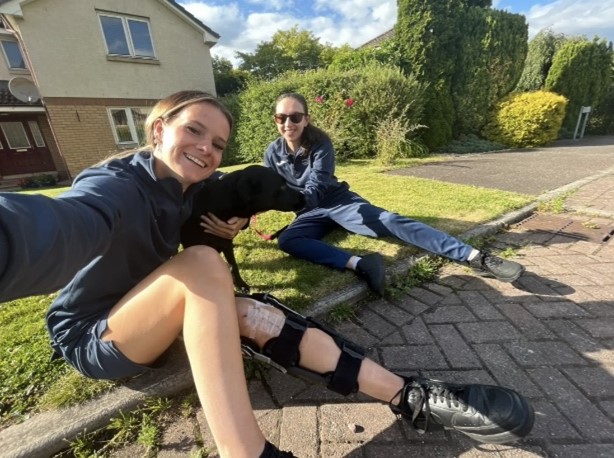[ad_1]
Hi, I am Megan, and I am an MSc Physiotherapy student at Edinburgh Napier University on my first placement with Alzheimer Scotland and writing my first blog!
I would like to share my experience from the other side of being a student practitioner, by sharing my own patient story of physiotherapy treatment. I am currently under the care of a physiotherapist due to recent surgery on my knee. I have had multiple surgeries now, and through these patient experiences I have found it easier to relate to and understand those who have been given a diagnosis or a piece of information they don’t understand in relation to their health.
Has this ever happened to you in relation to your dementia?
It’s tricky being told you can’t do something by someone who hardly knows you and doesn’t understand how much not doing “that thing” can affect you both psychologically and physically. Being a clinician that understands why this process is important in moving forward doesn’t make it any easier.
I realise it is very important for clinicians and patients to listen to one another. This may include talking about who you are, dealing with unwelcome news, or about how receiving a diagnosis may affect you, your family, your career, your hobbies, and your mental state. Having to continue with daily tasks can be very frustrating, as its difficult to focus on normal activities or step away when you feel overwhelmed. With my further patient understanding, I know that you can’t always understand straight away or come to terms with a diagnosis just because you’ve been given this. It takes time.
Information takes time to process. There needs to be an understanding, non-pressured environment where there is time to process, discuss, and personalise a plan. There are resources that can help with this, such as the Getting to Know Me Document. The document consists of information regarding what is important to the person including hobbies, life events, family, medication, personal references and much more. This document allows for a connection between an allied health professional, staff and person. This therefore also allows for a more personalised plan to be taken forward and adapted to the person’s needs. Have a go at the getting to know me document here.
Now studying physiotherapy, I further understand the deeper psychological impact that co-exists with the physical side of rehabilitation. Therefore, making short term and long-term goals alongside an action plan can help to understand what direction your rehabilitation is going in. This has enhanced my understanding of breaking down sections into achievable motivations and how you can move on positively to the next goal. I feel this should be taken further and supported with positive reinforcement with the completion of aspects of a tailored plan.
Your steps in your rehabilitation process may be huge, but we all need to understand that there will be smaller processing steps you are working through in the background.
- What are your short-term goals in relation to your life with dementia?
- Who can help you with these goals?
- How do you plan to achieve these goals?
What are your thoughts, let us know in the comments 😊.
Also, when on my placement at Alzheimer Scotland, I will be posting on the AHP dementia Instagram pages on a Monday and a Thursday so pop over there and see what you think.
Contributor
Megan Roberts
First year physiotherapy student, Edinburgh Napier University
@ megan_robsss
[ad_2]
Source_link




